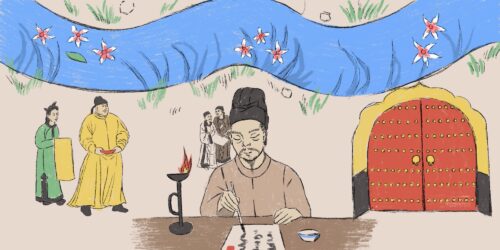Hai Zi wrote poetry from a world beyond politics. We could use him now
At the age of 25, Hai Zi killed himself by laying down on railroad tracks. But in his short life, he produced around 1,000 pages of poetry, some of which guaranteed he'll be remembered forever.

“Anyone who wants to understand modern China has to read Hai Zi.”
I didn’t know who Hǎi Zi 海子 was when I began my master’s degree program in modern Chinese literature at Nankai University in Tianjin in 2009. But I heard this phrase from a fascinatingly broad spectrum of people. Cab drivers, university professors, fruit sellers all spoke of him in affectionate, wistful tones, the way you might about that eccentric uncle who moved to Thailand to start a hacky sack factory, or that one friend from high school who was so serious about the guitar that he never showed up to school dances and eventually went on to co-found Phish.
University academics got serious when Hai Zi’s name was brought up, as though every other subject of study was a matter of detached professional scrutiny, but this one was something to be treated differently, a sacred relic on a shelf of muddy artifacts. The numbers even bear this out. A quick search on CNKI, a database of Chinese academic work, yields 2,410 published articles on Hai Zi. To put that number in perspective, consider that Běi Dǎo 北岛, one of the most well-known Chinese poets outside of China, has 987 entries. Everyone wants to write about Hai Zi, read him by candlelight in darkened dorm rooms (a story I’ve heard from several different Chinese friends), or at least prove they know who he is.
I have been pondering, off and on since finishing my master’s degree in 2012, the question of why this is. Why Hai Zi? China has produced some of the greatest poetry in world literature, but there are no candlelight vigils or hushed tones for Dù Fǔ 杜甫 or Qū Yuán 屈原. I have found, discarded, and re-discovered multiple possible answers to the question, but for the purposes of this short article I’d like to explore one that sticks with me:
Hai Zi wrote from a place his readers had only imagined seeing, a place beyond politics and national identity. He was a stranger from a strange land, but one whose writing offered an invitation to join him when he returned.
Hai Zi’s adherents — and they are legion — almost all latch on to him as China’s great “apolitical” poet.
It’s unlikely you have any idea who I’m talking about if you didn’t grow up with Chinese poetry. Here is almost the sum total of important facts about Hai Zi: He was born in Anhui Province to a rural family. He started as an undergraduate at Peking University at the age of 15 (which is crazy), then went on to work at the China University of Political Science and Law. He traveled to Tibet. At the age of 25 he went out to the Shanhaiguan rail line and laid his body on the railroad tracks, and was run down by a train. Nearby was found a bag with four books: a copy of the Bible, a collection of stories by Joseph Conrad, Walden by Henry David Thoreau, and Kon-Tiki by Thor Hyerdal. There are a few other assorted facts, and Hai Zi’s close friend Xī Chuān 西川, one of China’s greatest living poets, will tell a story or two about him if not pestered too much, but that’s hardly the stuff of a Hollywood biopic. It’s barely enough for a Wikipedia page.
Part of Hai Zi’s appeal is precisely the scarcity of information we have about him. Audiences will always be drawn to the romantic loners who die young, because it’s so much easier to transpose how they think and feel onto them. Somebody with no firm ties to something can be open to ties to anything. But Hai Zi was no tabula rasa. Quite the contrary, his adherents — and they are legion — almost all latch on to him as China’s great “apolitical” poet.
When I first heard this as a master’s student, I responded with a know-it-all eye-roll and the solemn judgment, “Ah yes, but to reject all political stances is itself a political stance.” Ergo, etc. But, as I’ve come to see since, one culture’s “apolitical” is not another’s, and at least from the perspective offered by seven years of separation, I think I have a better understanding of what my friends meant. Because ultimately, what’s interesting is not that Hai Zi was apolitical for his many admirers, but rather how. Let’s look at two examples.
Among the 1,000 or more pages of poetry he left behind, undoubtedly the strangest is the unfinished cycle The Seven Books of the Sun, an absurdly ambitious attempt to subsume all of world history into a work of total art, one that occupies almost a fourth of Hai Zi’s total output. Some of the settings of the “books” include the separation of the continental plates, a poetry competition in ancient Babylon, a baptism by Jesus in an unnamed river, and multiple execution grounds. There are references to Percy Shelley, Jesus, Lǎo Zi 老子, Holderlin, Shakespeare, and Confucius (Kǒng Zǐ 孔子), to name only a few of hundreds. The different “books” in the cycle run the stylistic gamut from long-form prose poems to folk songs to lyrical ballads to theater. During the few years he worked on the cycle, he seems to have been living in a place where any writing and any topic was fair game, which at first blush feels like unrefined artistic hyperactivity. Another way to read it, though, is as an introduction to the real world in which Hai Zi lived. From this perspective, poetry was not a craft through which he expressed his feelings about the world; instead, life in the world was a way of expressing the poetry in which he lived. He felt himself to be a citizen of the craft of poetry, and perhaps more than that: an actual creation of it. Certainly every reference and historical or geological theme explored is done so self-consciously through the lens of poetry. The increasingly bizarre and sprawling output of his final years might then be read as the “real” world bleeding into the “created,” with the result that he gave himself over to the former in the only way he knew how.
If I’m right, then Hai Zi’s most powerful legacy, and the one that continues to inspire midnight group readings by candlelight, is that his poetry appears to come from a place that is inaccessible to politicians (or those with political motives), and accessible to everyone else. It’s a place that doesn’t require the visitor to hate the Communist Party, or the U.S. government, or school. In fact, no hatred is required at all, or support either, for that matter, because the vastness of poetry has made all institutions relative. Indeed, Hai Zi even seems to have anticipated his readers seeking out such territory in what is by far his most famous poem — “Facing the Sea, Spring Blossoms Open” (面朝大海, 春暖花开 miàn cháo dàhǎi chūnnuǎn huā kāi) — and the one likely to be quoted back to you (seriously: quoted to you, not mentioned in passing) if you bring up Hai Zi’s name. It’s one of the last poems he ever wrote, and ends with the following stanza (my translation):
Give a warm name to every river and every mountain
Stranger, I also wish you good fortune
And a wonderful future
And that love will find a way for you and your descendants
And that from this common world you will wrest happiness
I want simply to watch the sea, and watch the spring blossoms open.
Two things are most striking here. First, the speaker is very clearly offering parting thoughts, and they are very much in the form of a benediction. You can imagine Chinese high school students, forced to study poetry in their classes, coming across these very simple blessings and immediately liking the person who wrote them. Second, consider the final line, which is also the title of the poem. The immediate image is of someone standing on the seashore, or on a rock above it. In the context of the poet’s impending suicide, it’s easy to see the image as being of a person about to leave this life, gazing in his waning moments on a land no one but he can see. But perhaps our mistake is in believing that Hai Zi was watching the spring blossoms open from our side of the ocean. If he only truly felt at home in poetry, then he could as easily be gazing across an ocean from the other side, a place he hopes we can see, but can’t now, and into which he is shrinking as he writes, the spring blossoms and the world they include growing fainter as he goes.
What Hai Zi’s work promises to those inclined to think of it in this fashion is a way to reclaim life on their own terms. Whether the Party rises or falls, or the U.S. dominates or dies, poetry, and the land on the other side of the sea it promises, will always be there. That this vision remains so powerful, and so popular, in China should be a provocative thought for those studying the culture. It suggests that the ultimate desire of a large number of Chinese readers is not the subversion of the Party or the U.S. or any other entity, but simply room to be.





